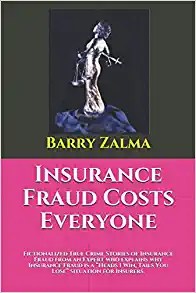The Contractor

The Following is a Fictionalized True Crime Story of Insurance Fraud from an Expert who explains why Insurance Fraud is a “Heads I Win, Tails You Lose” situation for Insurers.
Post 4754
See the full video at https://rumble.com/v4j0ccl-the-contractor.html and at https://youtu.be/3b-cks5aaSE
 Insurance Money Tempts Honest Men to Commit Fraud
Insurance Money Tempts Honest Men to Commit Fraud
Fire reconstruction is a competitive trade. Work, rebuilding burned out businesses, commercial structures and homes requires specialized skill. Obtaining payment from insurers for this specialized work requires a gregarious personality, a talent at marketing, and the skill to do the work to perfection.
Willis Rafter was not gregarious, had no talent at marketing and was a sloppy and unskilled builder. For Willis to be successful as a fire reconstruction contractor required imagination and a lack of morals. Willis found he obtained few construction jobs because of his lack of skill. He never received repeat business. He anticipated bankruptcy.
Rafter Construction was dying. Willis had only one regular insurance company contact. He would only win one of 20 bids. He met with his contact — Louise Adjusted — at lunch and begged for help.
“Louise, how can I save my business?” Rafter asked. “You know I do competent work. If I can’t get jobs, I must go out of business.”
“It’s simple” she said “every time you bid you must let the adjuster know that cash is coming to him.”
“I don’t understand.”
“Simple, the going rate in this town is 5% for the adjuster and 5% to the supervisor, cash.”
“What do you mean, 5% of what?”
“The contract prices. If the adjuster and his supervisor know, they will get 5% in cash of your contract price you will get every job.”
“But that is illegal, isn’t it?”
“Sure, but nobody cares. No one has ever been arrested. The company knows they don’t pay us much so they expect us to take money from the contractors as a bonus.”
“If I tell you that I will give you 10% of the next job I bid on will I get it?”
“Of course, silly, I though you would never catch on.” Louise responded, giggling.
So started the criminal career of Willis Rafter. His small construction company grew with alacrity. By the simple expedient of delivering envelopes containing cash to underpaid claims adjusters and claims supervisors Rafter Construction became a success. Willis considered the payments to be a cost of doing business. He, still considering himself to be an honest man, even reported the payments to his accountant as referral fees. Each April 15 he would file his tax returns and show, as business expenses, the payments he made to adjusters and supervisors.
He found, although slightly more expensive, additional sources of referral in the community of Public Insurance Adjusters. When he obtained referrals from them, he found it necessary to increase his unit costs to cover the extra fee. Rafter Construction became a power in the fire reconstruction business in his community. He had ten estimators working for him and always operated with four to ten construction projects going twelve months a year. He cursed his own stupidity for not learning the simple fee-based method of obtaining business.
Louise, as his best friend in the business — the person who taught him how to be a success — always received an annual $5,000 bonus.
 Willis was shocked when, after a routine IRS audit — six years into his business career as a successful fire reconstruction contractor — he was arrested for tax evasion. The IRS concluded that since the payments to the adjusters and supervisors were illegal in California [a violation of California Penal Code § 550] he could not deduct them as business expenses. He was shocked. He did nothing wrong. Willis insisted on a trial and told the jury that his payments to the adjusters were a simple, straightforward business expense no more evil than paying for lumber.
Willis was shocked when, after a routine IRS audit — six years into his business career as a successful fire reconstruction contractor — he was arrested for tax evasion. The IRS concluded that since the payments to the adjusters and supervisors were illegal in California [a violation of California Penal Code § 550] he could not deduct them as business expenses. He was shocked. He did nothing wrong. Willis insisted on a trial and told the jury that his payments to the adjusters were a simple, straightforward business expense no more evil than paying for lumber.
Willis was wrong. The jury found he had violated criminal provisions of the Internal Revenue Code and the California Penal Code. He was sentenced to six years in the Federal Penitentiary.
To this day he believes his arrest and conviction were a miscarriage of justice. That there was no crime in what he did.
To this day, the adjusters, supervisors and public adjusters who took the money — but never reported their illegal earnings on their tax returns — continue to collect money from contractors as a prerequisite to awarding a fire reconstruction job.
Crime like this will continue unabated as long as each insurer underpays and under trains its claims staff and tempts them to bribery. Crime like this will also continue until insurers investigate and fire the adjusters who take the bribes.
Adapted from my book “Insurance Fraud Costs Everyone” available as a Kindle book or paperback from Amazon.com.
 (c) 2024 Barry Zalma & ClaimSchool, Inc.
(c) 2024 Barry Zalma & ClaimSchool, Inc.
Please tell your friends and colleagues about this blog and the videos and let them subscribe to the blog and the videos.
Subscribe to my substack at https://barryzalma.substack.com/publish/post/107007808
Go to Newsbreak.com https://www.newsbreak.com/@c/1653419?s=01
Go to X @bzalma; Go to the podcast Zalma On Insurance at; Go to Barry Zalma videos at Rumble.com at https://rumble.com/c/c-262921; Go to Barry Zalma on YouTube- https://www.youtube.com/channel/UCysiZklEtxZsSF9DfC0Expg.
Go to the Insurance Claims Library – https://lnkd.in/gwEYk
Like this:
Loading…




